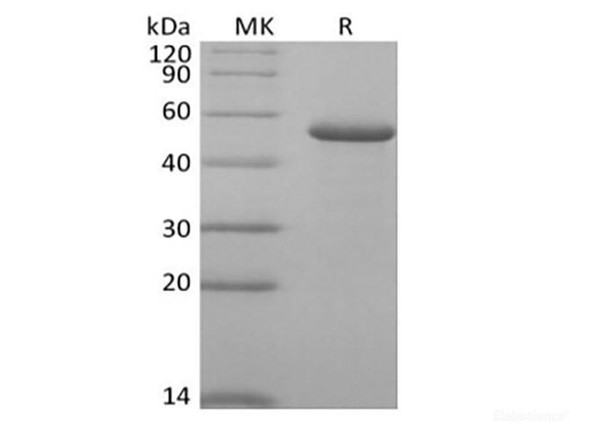| Sequence: | Ala21-Ala415 |
| Accession: | P05543 |
| Storage: | Generally, lyophilized proteins are stable for up to 12 months when stored at -20 to -80°C. Reconstituted protein solution can be stored at 4-8°C for 2-7 days. Aliquots of reconstituted samples are stable at < -20°C for 3 months. |
| Shipping: | This product is provided as lyophilized powder which is shipped with ice packs. |
| Formulation: | Lyophilized from a 0.2 μm filtered solution of PBS, pH 7.4. Normally 5 % - 8 % trehalose, mannitol and 0.01% Tween80 are added as protectants before lyophilization. Please refer to the specific buffer information in the printed manual. |
| Reconstitution: | Please refer to the printed manual for detailed information. |
| Background: | Serpin A7 is a secreted protein which belongs to the Serpin family. As a 54 kDa protein, Serpin A7 is synthesized primarily in the liver and secreted in plasma. Genomically, Serpin A7 is a serpin, although it has no inhibitory function like many other members of this class of proteins. Serpin A7 binds thyroid hormone in circulation. It is one of three proteins (along with transthyretin and albumin) responsible for carrying the thyroid hormones thyroxine (T4) and 3,5,3’-triiodothyronine (T3) in the bloodstream. Of these three proteins, Serpin A7 has the highest affinity for T4 and T3, but is present in the lowest concentration. Despite its low concentration, Serpin A7 carries the majority of T4 in serum. Due to the very low serum concentration of T4 and T3 in the blood, Serpin A7 is rarely more than 25% saturated with its ligand. Unlike transthyretin and albumin, Serpin A7 has a single binding site for T4/T3. Serpin A7 tests are sometimes used in finding the reason for elevated or diminished levels of thyroid hormone, and defects in Serpin A7 are a cause of Serpin A7 deficiency. |






